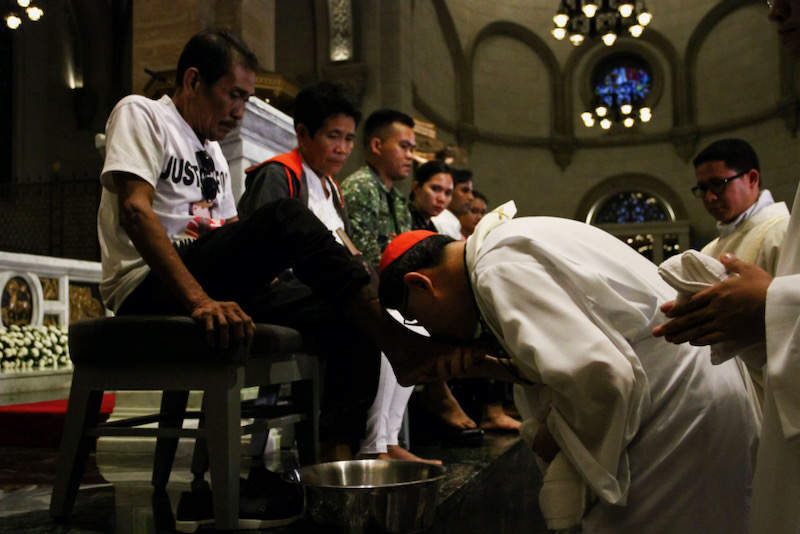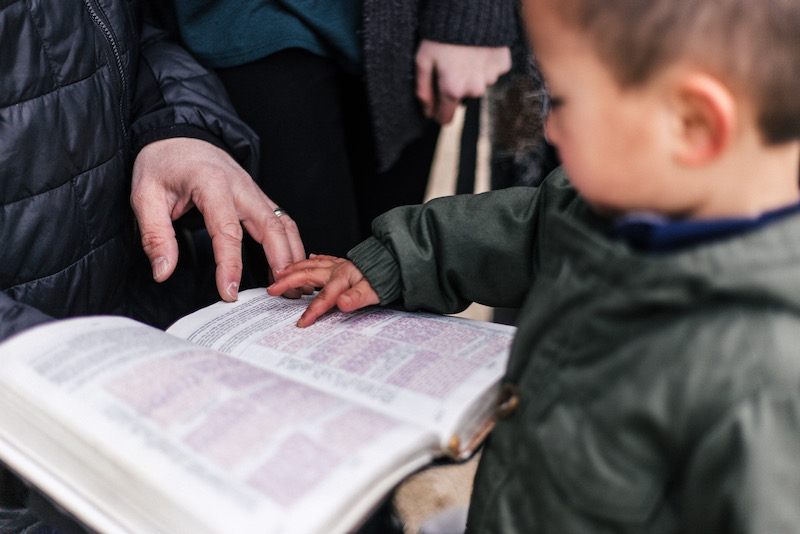It’s impossible to bring up children today “in the faith”, as we used to say, without knowing that this is not only counter-cultural but practically subversive. Britain has not been a Christian country since at least the seventies, I would say, and being Catholic has been counter-cultural since Henry VIII.
You bring up your children to give them the tools and skills they will need to be safe, competent and (you hope) successful as adults. This goes back to the beginnings of human history. You know that you are not going to be around forever, so you try to ensure that your children, your most precious children, will be able to cope on their own. Survival and health first: you teach them to keep themselves clean, to eat only safe things, to find or make coverings for warmth, to find or make shelter, to avoid tall trees in a storm, not to swim where there are whirlpools, not to tackle a large animal alone.
As time went by, certain skills have become less useful. Most of us in this part of the world don’t have to kill our own meat or defend our shelter against bears. But there are still skills which need to be passed on, and in today” s school curriculum there is still something called “life skills”, though its meaning has changed.
The problem with being counter-cultural, though, is that you may be teaching your children something which puts them at a disadvantage. This has always been a problem with Christianity, as the founder was aware. Doing good to those that hurt you, turning the other cheek, going an extra mile, can turn you into a perpetual patsy, can’t it? Is it fair to our children to handicap them like this? Surely we need to make sure that they have enough nous, enough savvy, enough street smarts to be able to get ahead of everyone else, or at least keep up with them? Sadly no, Christianity means that we probably are making life more difficult for them.
There are plenty of things which are applauded, or regarded as successful, in real life and yet I wouldn’t want to see my children doing. Just because some politicians succeed egregiously by lying, that doesn’t mean I want my children to regard telling the truth as negotiable. But of course, someone who always tells the truth is at a disadvantage in competition with a plausible liar.
So as a parent you work out what is and what isn’t negotiable, trying always to be fair and not to make the burdens of others too heavy to carry. You try not to saddle your children with your own mere preferences, but with more important values. As a small minority in the country, they will be challenged, sometimes with hostility, and they need to be able to answer questions about why they think or do so-and-so, more convincingly than just saying that” s how they were brought up. So questions and arguments are a good thing (even if often appearing at an inconvenient time. That is just a fact of family life.
You have to sort out what the Church teaches and what you believe, and if they don’t match, why not, before you can pass any of it on. One huge advantage of being a cradle Catholic is that you feel secure enough in your position as such that you can judge for yourself which elements you would go to the stake for. You can apply your knowledge of history to conclude that certain elements are due to politics and date rather than to what God wants. If you are a convert, you will be quizzed over aspects which you feel free to park on the back burner as a cradle Catholic. I am deliberately avoiding giving examples here; but it seems to me that this attitude of individual judgment is possibly the best argument for infant baptism. Some will condemn me here as a “pick-and-mix Catholic”; many in the Catholic blogosphere shout that anyone who doesn’t believe everything they believe isn’t a “real” Catholic and should leave the Church; but as a cradle Catholic, you know that you belong, and nobody (except the Pope) can tell you any different.
We can’t all be theologians, but we are all individually responsible for what we believe and put into practice. And I mean individually: we have to give our children the tools and information they need, and after that they must and will make their own choices. They may (indeed, they will) go through different stages, when the peer pressure and the fear of being thought “pi” or standing out may be too much to handle, but you have to hope that the roots go deep enough to hold. It’s worth thinking about and keeping an eye on what books they are reading, and judiciously inserting an old-fashioned one now and again, so that they can see that living within a Christian framework is not now and has not been totally quirky. There are modern books that fit the bill too, but you need to be alert to come across those, because they are unusual; counter-culturalism means precisely that.
I remember having a conversation with friends years ago, before our children were even of school age, and being very struck by one mother who said that she would much rather her beloved son were bullied than a bully. I was surprised at first, but I went away and thought about it, and soon decided that she was absolutely right. It is truly awful if your child is bullied. But I would rather have to cope with that, with all the need for advocacy, family support, protection and any other compensating things you can think of, than have to deal with my child” s thinking that bullying someone else is acceptable behaviour.
In the current awful circumstances, where yet again the safety of women in the streets is being discussed, there is a real opportunity for counter-culturalism to act as a prophetic voice. If everyone is equally precious in God’s sight, if we are all “luminous beings” , how dare some of us treat others with such disrespect, from street hassle to murder? I want my daughters to be safe; I believe that my sons do not consider sexism, however expressed, acceptable, let alone sexist violence of any kind.
But it should not just be mothers and fathers pushing the message. Here the Church really needs to take a stand and, for once in the gender debates, put itself on the side of justice and truth. In Catholic countries, the street harassment of women and girls is pervasive (I speak from personal experience); in the United Kingdom, I think it has got worse in my lifetime, partly because women don’t see why it should always be up to them to stay out of sight. I have never heard a single sermon about respecting women as other human beings, though I have sat through harangues about (im)modest dress and the danger of inflaming lust. This is not a women’s problem; it is a male problem. A counter-cultural call from the Church here would be surprising, but very welcome.
Another danger of being counter-cultural is enjoying it too much, either becoming a permanent contrarian or feeling that being different is somehow to be intrinsically better. This is a very Catholic risk. Some people use their religion as a sort of licence to snobbery. The children have a label which they apply to certain people, “posh young catholics” , which dates from Rachel” s time at university, but it has stayed current because each of the subsequent children found a similar group easy to identify. Luckily we their parents apparently didn’t and don’t qualify (and not just because we’re Too Old). John told me that he thought we had managed to bring them all up informed but not barking, which I thought was quite a compliment.
I suspect Catholic counter-culturalism is different in countries where Catholicism is what you might call the default religion, but we’ve never lived in any of those as a family, except briefly. In France Catholicism is natural, but there is laïcité as well as atheism to prevent people getting too comfortable; in Italy there is a sort of opposite attitude, where everyone is Catholic so no one has to take it too seriously, like the Irish joke about some man being very religious because his wife goes to church. We have lived mostly in Orthodox countries, where Catholics are regarded with a sort of benign suspicion, but nobody asks you any questions or seeks to discuss anything, because they think their own answers are already better than yours could be.
We experienced acute, potentially painful (not so much for us, as for our contacts) counter-culturalism in communist Prague and later in Moscow, and there we were lucky enough to meet local Catholics and hear about their experiences. At Mass on Sundays, there were always people at the back, making notes of who was there. Later, by a circuitous route, we even saw some of the clandestine photographs that were taken. The worst thing that could have happened to us would have meant being sent home, but for our friends it was different.
It’s all very well being brave on your own behalf, but I was deeply impressed by the courage of those who knew that their children’s prospects would be damaged by their going to Mass, and yet took them anyway. Our friends were told that their children would not be allowed to go to the secondary schools they qualified for, nor to university. This was all explained to us by a qualified astrophysicist who could get a job only as a stoker on the Metro. Here in England we have not had to deal with that sort of pressure for a long time and I think it would be very difficult to withstand. We met many heroes.
I am delighted to say that things worked out for our Prague friends, after the Berlin Wall came down. In Moscow and in so many other places, the problems remain. Our counter-culturalism is much easier than other people’s; but in the end, it is unavoidable, and we have to embrace it. Hungering and thirsting for righteousness may bring a blessing, but for the moment, we have to cope with feeling hungry and thirsty.
Kate Keefe composes musical settings for the Mass and writes about the psalms. You can follow her on Facebook, Twitter and LinkedIn



 Loading ...
Loading ...
What do you think?
You can post as a subscriber user ...
User comments (0)